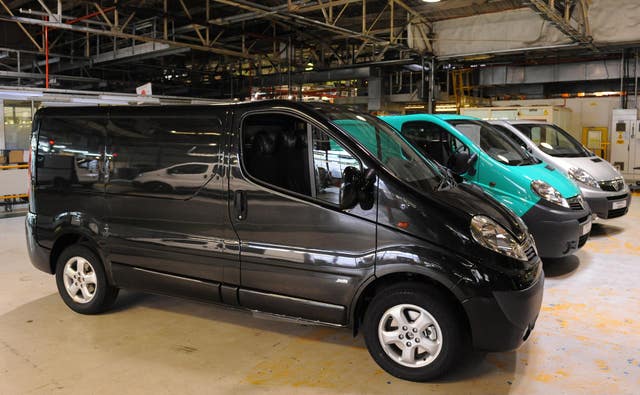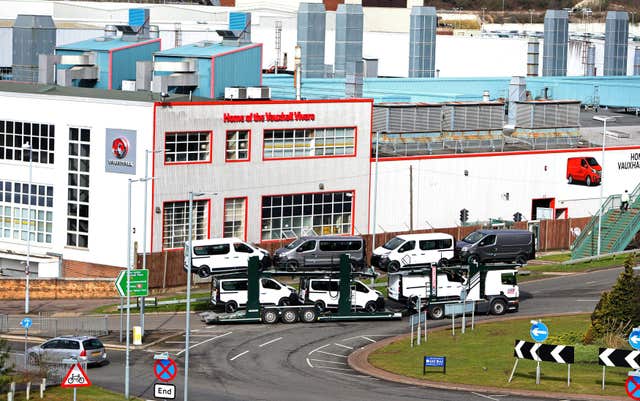
Motor giant Vauxhall is to build a new van at one of its UK plants, giving a huge boost to the automotive industry.
The move will safeguard the 1,400 jobs at the firm’s Luton factory and is also expected to create more roles.
The new Vivaro van will replace the current model from 2019.

The plant’s capacity will increase to 100,000 a year. Around 59,000 vans year are currently built at Luton.
Business Secretary Greg Clark said the decision was a vote of confidence in Vauxhall’s workforce and the UK’s automotive sector.
“This investment in upgrading the production platform will safeguard and grow jobs, ensuring the future of the Luton plant well into the next decade and help ensure the plant is well positioned for future Vauxhall models to be made in the UK.”

Carlos Tavares, chairman of Vauxhall owner Peugeot Citroen, said: “Performance is the trigger for sustainability and I would like to thank all stakeholders involved and underline the open mindset of our union partners as well as that of the UK Government.
“This is a major milestone for the future of the Luton plant and a key enabler to serve our ambitions in the commercial vehicle market.”
The company declined to say how much money it will be investing in Luton but described it as “substantial.”
The Government and Luton Council have given money for the new van to be built in the UK.

Company officials said the new van could have been built in Germany or Poland, but Luton is the only plant with a paintshop, which is one of the reasons for the decision.
The move means that Peugeot and Citroen vans will be built alongside the Vivaro.
PSA Group officials admitted there was uncertainty over Brexit, but extra capacity is needed now.
The UK’s biggest companies, including Royal Mail and BT, buy Luton-built vans, although around 60% of the plant’s output is for export.
The announcement was made in front of hundreds of workers and local dignitaries on the floor of the Luton plant, which has been making vehicles since 1905.
Mr Clark said the Government’s investment was £9 million.
Mr Tavares said a decision on the future of Vauxhall’s Ellesmere Port car factory would be made in 2020.
Asked about uncertainty over Brexit, he said the Government had given assurances about seeking tariff free and frictionless trade with the EU.
“If you wait for everyone to decide if it is the right time to invest, the only thing you are sure about is it will be too late,” he said.
Mr Tavares said the company could have decided to build the new van in France.
Unite said the investment was £170 million, adding it would create 450 jobs.
General secretary Len McCluskey said: “It is great news that this new product should see van production at Luton for the next 10 years to come.
“This is a very welcome investment in Luton by PSA, and a deserving tribute to a dedicated workforce. It will steady nerves at the plant after years of uncertainty.
“It will, of course, be for the members at the plant to decide to accept the whole package of measures, including a pay deal along with the new product, and they will take that vote in the coming weeks.
“In the meantime I want to pay tribute to the stewards and members at both our Vauxhall sites, Luton and Ellesmere Port, for their commitment to delivering successful negotiations.
“The investment into Luton is very welcome but we do expect to hear of similar plans for Ellesmere Port, where the workforce has been just as loyal and is just as deserving of a secure future but continues to live with a cloud hanging over it.
“Vauxhall is a highly regarded British brand with over a century of motor manufacturing, with a strong and loyal UK customer following.
“Add to this the excellent productivity at our plants and the case for PSA to build a long-term home in the UK is a compelling one.”


Comments: Our rules
We want our comments to be a lively and valuable part of our community - a place where readers can debate and engage with the most important local issues. The ability to comment on our stories is a privilege, not a right, however, and that privilege may be withdrawn if it is abused or misused.
Please report any comments that break our rules.
Read the rules here